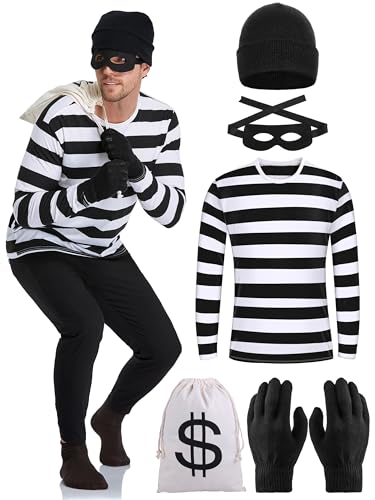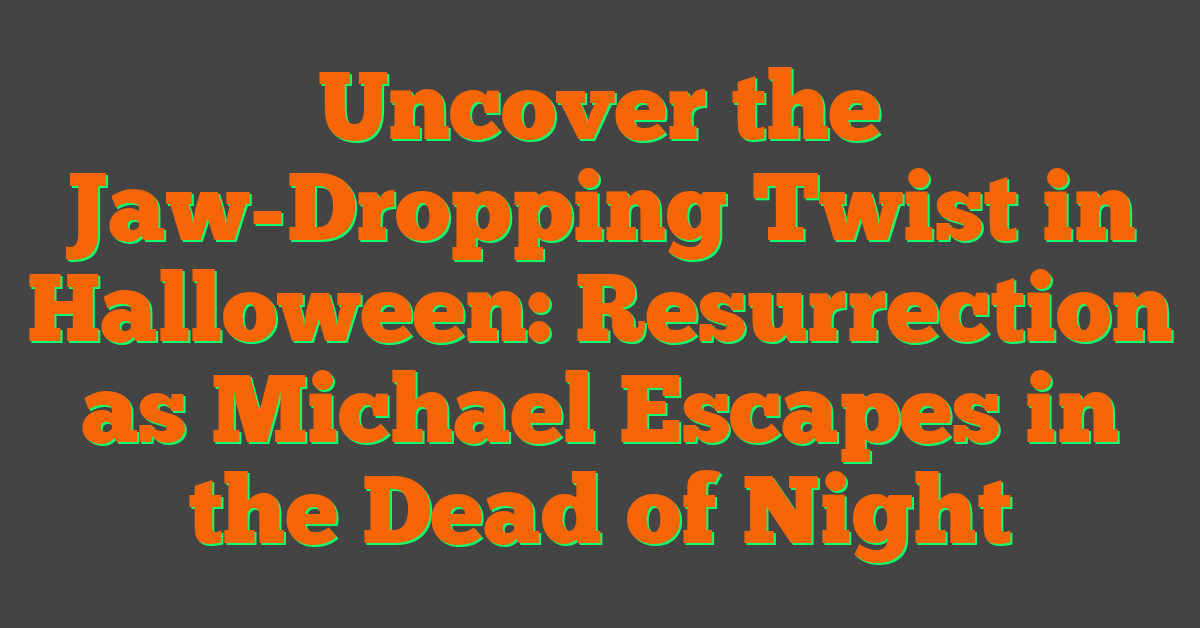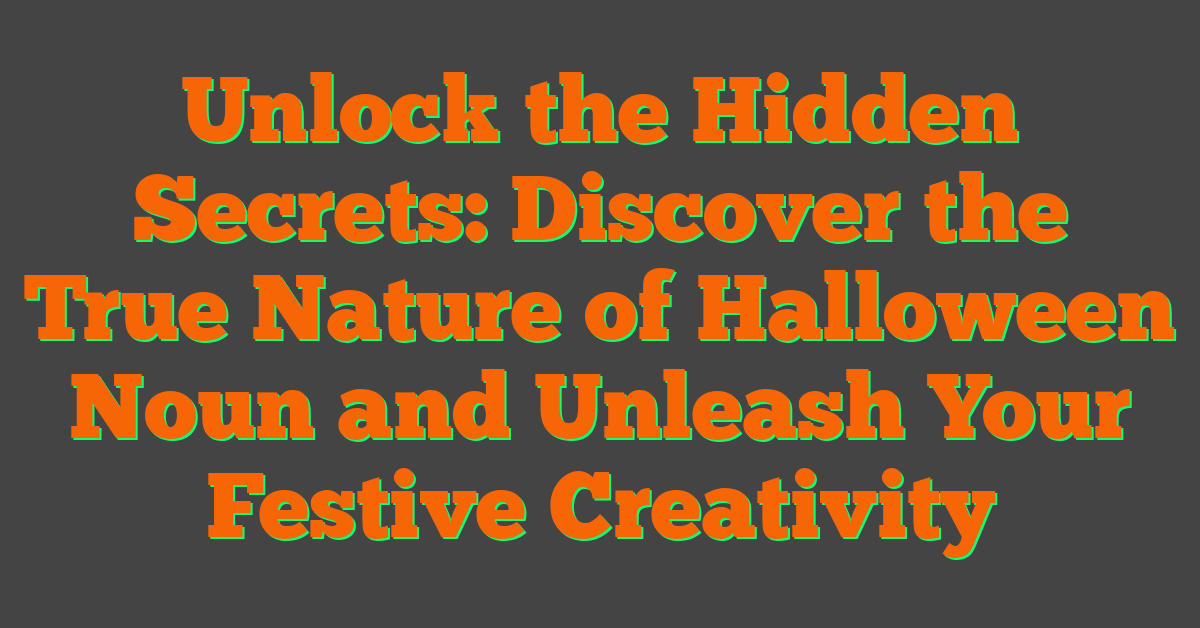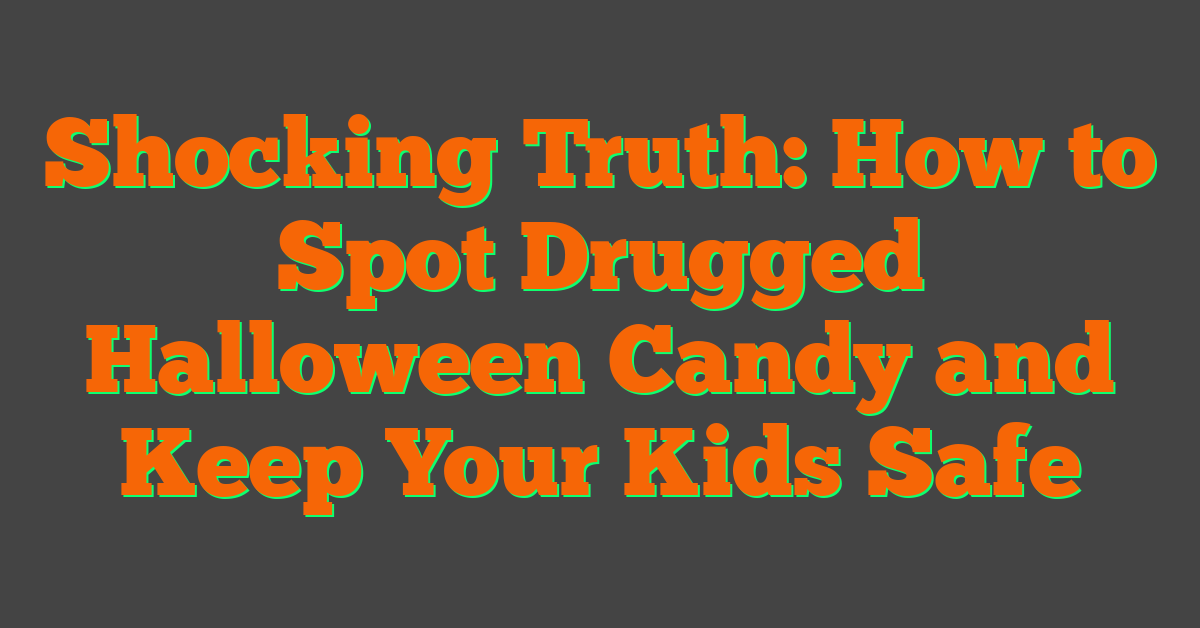Halloween, with its eerie costumes, spooky decorations, and trick-or-treating, is a holiday that has gained immense popularity around the world. But what does the Bible say about Halloween? In this article, we will explore the meaning of Halloween, its historical background, traditions, and customs associated with it. We will also delve into the question of Halloween in the Bible, examining whether the word “Halloween” is mentioned and if there are any connections between Halloween and biblical festivals or practices. We will examine how different Christian denominations view Halloween and whether it is compatible with Christian faith and teachings. Join us as we seek to understand Halloween from a biblical and Christian perspective.
Key takeaway:
- Halloween is not mentioned in the Bible: The word “Halloween” is not found in the Bible, indicating that it does not have a direct religious significance according to biblical texts.
- Halloween has historical origins and customs: Halloween has a historical background and is associated with traditions and customs that have evolved over time, incorporating elements from various cultures and belief systems.
- Halloween’s compatibility with Christian faith is varied: Different Christian denominations have varying perspectives on Halloween, with some embracing it as a cultural holiday and others viewing it as conflicting with Christian teachings. The interpretation of Halloween in relation to Christian faith and individual beliefs may vary.
Exploring the Meaning of Halloween
Halloween is widely celebrated around the world. Exploring the meaning of Halloween can help us understand its significance in different cultures. It originated from ancient Celtic traditions and has evolved into a day of festivities, costumes, and spooky fun.
One important aspect of Halloween is its connection to the supernatural and spiritual world. Many believe that during this time, the barrier between the living and the dead is thin, allowing spirits to roam. This belief is reflected in the tradition of dressing up in costumes and wearing masks, either to ward off or appease these spirits.
Another aspect of Halloween is the celebration of harvest. In many cultures, this holiday marks the end of the harvest season, a time to give thanks for the bountiful crops and prepare for winter. Carving pumpkins into jack-o’-lanterns symbolizes harvest.
Halloween also allows people to confront their fears and embrace the unknown. It’s a time for spooky stories, haunted houses, and horror movies, allowing us to explore our fascination with the supernatural and the thrill of being scared in a controlled environment.
To truly understand the meaning of Halloween, we must acknowledge its diverse interpretations across different cultures. The festivities and customs may vary, but the themes of honoring the dead, celebrating abundance, and embracing the mysterious are common threads that unite us.
In a small town in Ireland, every Halloween, the locals gather at the ancient ruins of a castle to celebrate. They believe that on this night, the spirits of their ancestors return to visit. Families come together, lighting candles and leaving offerings for their departed loved ones. It is a solemn and beautiful tradition that reminds them of the importance of honoring their heritage and connecting with their ancestors.
This true story showcases the deep-rooted traditions and intimate moments of reflection that are part of Halloween celebrations.
What is the Historical Background of Halloween?
What are the Traditions and Customs Associated with Halloween?
- Dressing up in costumes: One popular Halloween tradition is dressing up in costumes. People of all ages enjoy choosing and wearing costumes that represent various characters, such as superheroes, monsters, or iconic figures.
- Trick-or-treating: Children go door-to-door in costumes, saying “trick-or-treat” to receive candy or treats from homeowners. This tradition brings joy and excitement to kids and allows them to indulge in delicious treats.
- Decorating homes: Many people decorate their homes with spooky and festive decorations like jack-o’-lanterns, skeletons, and cobwebs. These decorations create a festive atmosphere and contribute to the Halloween spirit.
- Carving pumpkins: Carving pumpkins is a classic Halloween tradition. People scoop out the insides, carve faces or designs into them, and place candles inside to create illuminated jack-o’-lanterns.
- Haunted houses and hayrides: During Halloween season, haunted houses and hayrides become popular attractions. These activities provide thrilling and spooky experiences for those seeking a good scare.
- Parties and gatherings: Halloween parties and gatherings allow friends and family members to come together and celebrate the holiday. These events often include costume contests, games, and themed food and drinks.
In addition to these traditions, individuals and communities can celebrate Halloween in many ways. Suggestions include hosting a themed movie night, organizing a costume parade, or arranging a spooky scavenger hunt. Embracing these traditions and customizing them to fit personal preferences will ensure a memorable and enjoyable Halloween experience.
Halloween in the Bible: A Look at Scriptural Perspectives
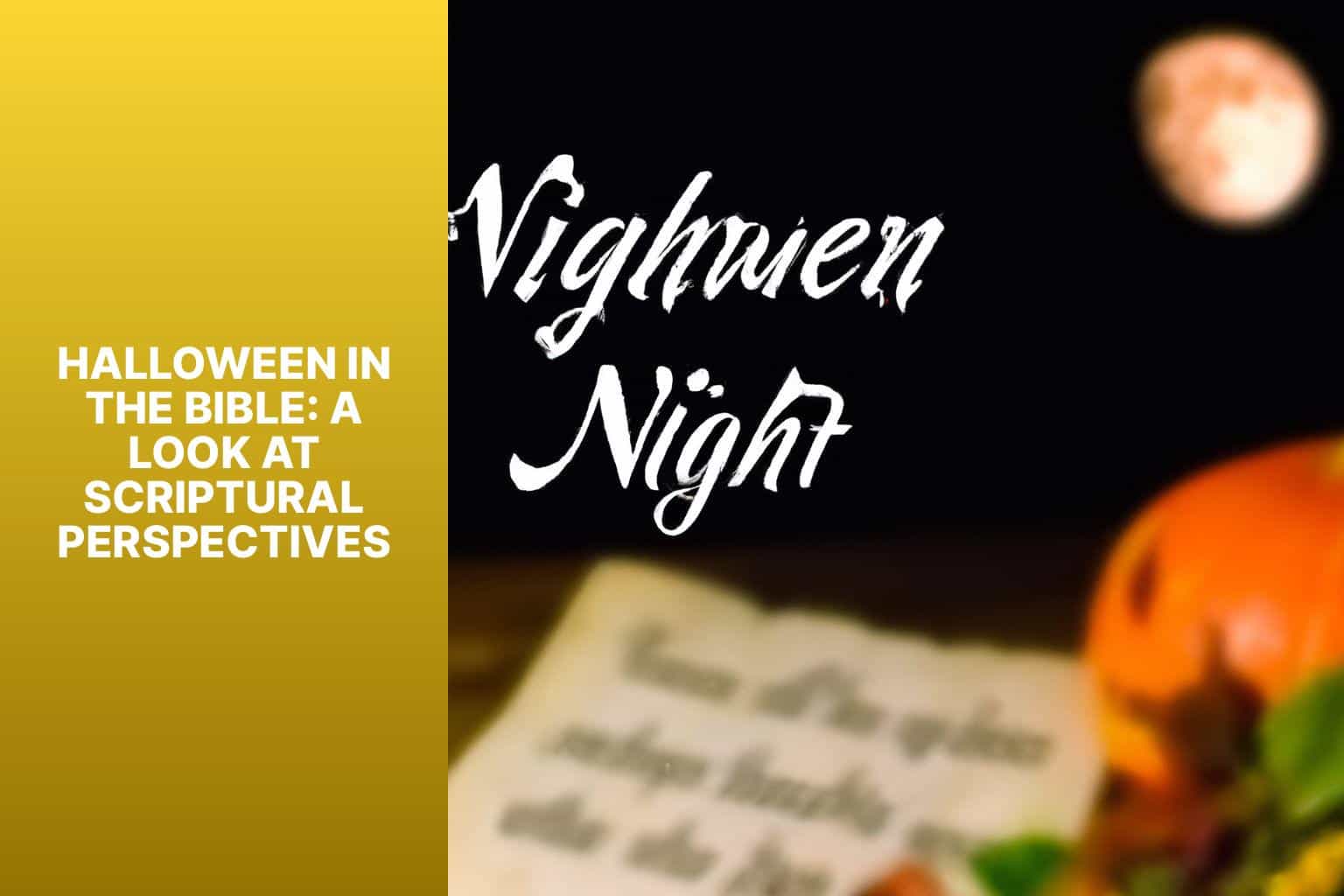
Photo Credits: Rickyshalloween.Com by Robert Robinson
Halloween is not mentioned in the Bible, but there are scriptural perspectives to consider. Here are some key points:
1. Pagan Origins: Halloween has roots in ancient Celtic festivals, like Samhain, which marked the end of summer and the beginning of winter. The Bible cautions against participating in pagan practices (Deuteronomy 18:10-12).
2. All Saints’ Day: All Saints’ Day, celebrated on November 1st, honors the saints and martyrs. The Bible encourages believers to honor and remember the faithful departed (Hebrews 12:1).
3. Discernment: Christians should exercise discernment, testing everything and holding on to what is good (1 Thessalonians 5:21). Evaluate Halloween practices and symbols to see if they align with biblical values.
Pro-tip: Instead of only participating in Halloween festivities, use this time to reflect on life, death, and the afterlife. Engage in meaningful discussions and reflect on scriptural perspectives.
Is the Word “Halloween” Mentioned in the Bible?
The question of whether the word “Halloween” is mentioned in the Bible has a straightforward answer: no, it is not. The Bible does discuss various religious and cultural festivals, but Halloween itself is not explicitly mentioned. The origins of Halloween can be traced back to ancient Celtic festivals like Samhain, which marked the transition from harvest to winter. Over time, the Christian holiday of All Hallows’ Eve combined with pagan traditions, leading to the modern celebration of Halloween.
Although the word is absent from the Bible, Halloween does share some similarities with biblical concepts related to remembering and honoring the dead. In Christianity, there are specific days like All Saints’ Day and All Souls’ Day dedicated to remembering and praying for departed souls. The specific practices associated with Halloween, such as dressing in costumes, going trick-or-treating, and carving jack-o’-lanterns, are not mentioned in the Bible.
When it comes to approaching Halloween, individuals should consider their own beliefs and the teachings of their respective faiths. Some Christian denominations may view Halloween as incompatible with their beliefs, citing associations with paganism or certain practices that they interpret as promoting fear or involvement in the occult. On the other hand, there are those who see Halloween as an opportunity for community engagement or a chance to distinguish the secular aspects of the holiday from its deeper spiritual meanings.
Are There Any Connections Between Halloween and Biblical Festivals or Practices?
There are connections between Halloween and biblical festivals or practices. Halloween, also known as All Hallows’ Eve, falls on October 31st, the eve of All Saints’ Day. This day honors all saints and martyrs who have passed away. The origins of Halloween can be traced back to the ancient Celtic festival of Samhain, which marked the end of the harvest season.
Halloween is also believed to have connections to the biblical festival of Sukkot, or the Feast of Tabernacles. Sukkot is a Jewish holiday that commemorates the time when the Israelites lived in temporary shelters during their journey in the desert. Both Sukkot and Halloween involve temporary shelters and celebrations for the harvest.
It is important to recognize that Halloween has evolved over time and may not align with the original biblical festivals or practices. The interpretation and significance of Halloween vary among different Christian denominations and individual beliefs.
Fact: The word “Halloween” is a contraction of “All Hallows’ Eve,” the night before All Saints’ Day. It incorporates elements of both Christian and ancient Celtic traditions.
Interpreting Halloween from a Christian Perspective
Interpreting Halloween from a Christian perspective involves considering its historical origins and its alignment with biblical principles. Christians should approach Halloween with discernment and wisdom, focusing on its impact on their relationship with God and others.
1. Assess origins: Halloween originated from Celtic customs and was later influenced by Christian traditions like All Saints’ Day. Recognize that certain aspects, such as costumes and candy, have become commercially driven but can still be enjoyed within reasonable limits.
2. Emphasize biblical values: Evaluate Halloween activities based on biblical principles. Engage in activities that promote love, kindness, and respect for others, while avoiding activities that glorify darkness, fear, or evil.
3. Seek fellowship opportunities: Use Halloween as an opportunity to connect with neighbors and community members. Organize alternative events like trunk-or-treat gatherings, where children can safely receive candy while also connecting with others in a positive environment.
4. Transform traditions: Incorporate elements that align with Christian values. Use pumpkins as a symbol of light and the presence of the Holy Spirit, or focus on gratitude to God for His provision during the harvest season.
5. Educate and guide children: Teach children about the origins and significance of Halloween, helping them understand the boundaries and purpose of their activities. Encourage them to make choices that honor God in their participation.
By interpreting Halloween from a Christian perspective, believers can navigate this holiday with discernment and make it a meaningful and positive experience within the context of their faith.
How Do Different Christian Denominations View Halloween?
Christian denominations have varying views on Halloween. Some, such as Catholicism and Anglicanism, view it as a cultural celebration and have no issue with their members participating in activities like trick-or-treating or costume parties. They see it as a time for community and fun. Other denominations, like some conservative Protestant groups, may have reservations about Halloween due to its pagan and occult origins. They may discourage their members from participating in Halloween celebrations and instead encourage alternative activities, such as church-sponsored events like “Hallelujah Nights” or harvest festivals.
It is important to note that while some Christian denominations may have differing views on Halloween, they all emphasize the need for individuals to use discernment and consider their own beliefs when deciding how to engage with the holiday. How do different Christian denominations view Halloween? The perspective on Halloween within Christianity can vary greatly depending on the denomination and the individual’s personal convictions.
Respecting diversity and engaging in open dialogue is crucial when considering how different Christian denominations view Halloween. Instead of dictating what one should or should not do, a more constructive approach would be to foster understanding and respect for varying beliefs. Each person should make their own informed decisions based on their faith and personal convictions.
Is Halloween Compatible with Christian Faith and Teachings?
Halloween is a holiday with pagan origins and is not mentioned in the Bible. Due to its association with witches, ghosts, and other occult practices, some Christian denominations view Halloween as incompatible with their faith. Others believe that Halloween can be redeemed and used to spread the message of God’s love and light. The compatibility of Halloween with Christian faith and teachings depends on personal beliefs and how individuals choose to participate.
It is interesting to note that a survey conducted by the Pew Research Center revealed that approximately 46% of American Christians consider Halloween to be a religious holiday. Christians who choose to celebrate Halloween often focus on the positive aspects, such as dressing up in non-offensive costumes, hosting family-friendly events, and engaging with their communities. In the end, the compatibility of Halloween with Christian faith and teachings is a matter of personal interpretation and conviction.
Frequently Asked Questions
Is Halloween mentioned in the Bible?
No, Halloween is not specifically mentioned in the Bible. The Bible does address principles that can guide Christians in making decisions about participating in activities associated with Halloween.
What are the origins of Halloween in Christianity?
The origins of Halloween can be traced back to the ancient Celtic festival of Samhain, which marked the beginning of the season of darkness. In the 8th century, Pope Gregory III moved All Saints Day to November 1, making October 31 “All Hallows Eve.” Some pagan practices associated with this festival have been mixed into modern celebrations of Halloween.
Is participating in Halloween considered involvement in evil and darkness?
Some Christians believe that participating in Halloween is involvement in evil and darkness, as certain practices associated with Halloween, such as fortune-telling, sorcery, and witchcraft, are discouraged in Scripture. It is important to note that these verses do not specifically mention observing Halloween.
What is the view of Christians who celebrate Halloween?
Many believers who celebrate Halloween consider the activities to be harmless fun and argue that demonizing the holiday is an attempt to remove themselves from the world. They believe in being “all things to all men” in order to reach others with the message of Christ.
How can Christians engage with Halloween?
Christians have different ways of engaging with Halloween. Some churches hold “harvest festivals” as an alternative, incorporating costumes in a godly environment. Others use Halloween as an opportunity to share the Gospel by handing out tracts along with candy. Ultimately, the decision to celebrate or not celebrate Halloween is a personal one, based on individual convictions and backgrounds.
What principles should guide Christians in deciding whether to celebrate Halloween?
As Christians, it is important to consider the principles of Romans 14, which encourage not causing division or stumbling others in their faith, and doing all things as to the Lord. Christians should avoid participating in the darker aspects of Halloween and ensure that their attitude, dress, and behavior reflect a redeemed life.





